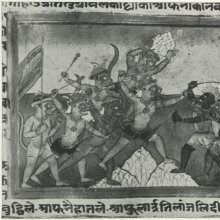Hanumannataka, Hanumannāṭaka, Hanuman-nataka, Hanumanataka: 4 definitions
Introduction:
Hanumannataka means something in Hinduism, Sanskrit. If you want to know the exact meaning, history, etymology or English translation of this term then check out the descriptions on this page. Add your comment or reference to a book if you want to contribute to this summary article.
Images (photo gallery)
In Hinduism
Kavya (poetry)
Source: Shodhganga: A critical study of the HanumannāṭakaHanumannāṭaka (हनुमन्नाटक).—Śrī Dāmodara Miśra’s Hanuman-nāṭaka is a Mahānāṭaka (a fourteen act drama), dealing with the story of Rāma. Here is found the description of the events starting from Rāma’s birth up to the death of Rāvaṇa, Rāma’s coronation and Sītā’s exile. But some variations from the Rāmāyaṇa have been made in the construction of the plot of the drama.

Kavya (काव्य, kavya) refers to Sanskrit poetry, a popular ancient Indian tradition of literature. There have been many Sanskrit poets over the ages, hailing from ancient India and beyond. This topic includes mahakavya, or ‘epic poetry’ and natya, or ‘dramatic poetry’.
Languages of India and abroad
Sanskrit dictionary
Source: Cologne Digital Sanskrit Dictionaries: Cappeller Sanskrit-English DictionaryHanumannāṭaka (हनुमन्नाटक).—[neuter] T. of a drama.
Source: Cologne Digital Sanskrit Dictionaries: Aufrecht Catalogus Catalogorum1) Hanumannāṭaka (हनुमन्नाटक) as mentioned in Aufrecht’s Catalogus Catalogorum:—It exists in two recensions, the more ancient by Dāmodara and explained by Mohanadāsa, and a recent one edited by Madhusūdana. Jones. 413. Io. 237. 320. 1830. Oxf. 142^b. 143. Paris. (B 127. 225. D 29). L. 1739. Khn. 44. K. 72. 74. B. 2, 126 (and—[commentary]). Report. Xiv. Ben. 37. 38. 40. Pheh. 5 (and—[commentary]). Rādh. 23. Oudh. Ix, 6. Xv, 36. Burnell. 174^a. Gu. 4. H. 102-4. Taylor. 1, 11. 80. 333. 476. Oppert. 588. 1087. 1975. 2662. 3669. 4668. 5126. 6117. 6703. 7044. 7454. Ii, 2268. 3226. 3748. 4833. 5602. 5866. 8428. 9073. Rice. 268. W. 1568. Peters. 3, 395. Verses from it Śp. p. 99.
—[commentary] by Candraśekhara. Io. 237.
—[commentary] by Nārāyaṇa. K. 74.
—[commentary] by Balabhadra Miśra. K. 76. Bp. 55. 263. 357.
—[commentary] by Mohanadāsa. W. p. 163. Oxf. 142^b. 143^a. L. 1740. K. 72. Report. Xiv. Ben. 40. Oudh. Ix, 6. Xv, 36. Xix, 46. H. 104.
Hanumannāṭaka has the following synonyms: Mahānāṭaka.
2) Hanumannāṭaka (हनुमन्नाटक):—See Mahānāṭaka.
3) Hanumannāṭaka (हनुमन्नाटक):—Fl. 450. Goldstu7cker 18. Oudh. Xxi, 48. Peters. 4, 31. Rgb. 466 (inc.). Stein 78.
—[commentary] by Balabhadra Miśra. Rgb. 466 (inc.).
—[commentary] by Mohanadāsa. Fl. 450. Oudh. Xxi, 48. Peters. 4, 31.
Hanumannāṭaka has the following synonyms: Mahānāṭaka.
Source: Cologne Digital Sanskrit Dictionaries: Monier-Williams Sanskrit-English DictionaryHanumannāṭaka (हनुमन्नाटक):—[=hanuman-nāṭaka] [from hanuman > hanu] n. Name of a drama (containing the story of the Rāmāyaṇa dramatized = mahā-n q.v.)
Sanskrit, also spelled संस्कृतम् (saṃskṛtam), is an ancient language of India commonly seen as the grandmother of the Indo-European language family (even English!). Closely allied with Prakrit and Pali, Sanskrit is more exhaustive in both grammar and terms and has the most extensive collection of literature in the world, greatly surpassing its sister-languages Greek and Latin.
See also (Relevant definitions)
Partial matches: Nataka, Hanuman.
Query error!
Full-text: Mahanataka, Damodara-mishra, Sitasvayamvara, Hanuman, Anita, Brahman.
Relevant text
Search found 7 books and stories containing Hanumannataka, Hanuman-nataka, Hanuman-nāṭaka, Hanumanataka, Hanumanāṭaka, Hanumannāṭaka; (plurals include: Hanumannatakas, natakas, nāṭakas, Hanumanatakas, Hanumanāṭakas, Hanumannāṭakas). You can also click to the full overview containing English textual excerpts. Below are direct links for the most relevant articles:
Hanuman Nataka (critical study) (by Nurima Yeasmin)
Part 1: Hanumannāṭaka: Title of the Play < [Chapter 3]
Source of the Plot < [Chapter 3]
Notices of Sanskrit Manuscripts (by Rajendralala Mitra)
Kuntaka’s evaluation of Sanskrit literature (by Nikitha. M)
13. Mahānāṭaka in Kuntaka’s treatment < [Chapter 4 - Kuntaka’s evaluation of Sanskrit Plays of other Poets]
9. Udāttarāghava in Kuntaka’s treatment < [Chapter 4 - Kuntaka’s evaluation of Sanskrit Plays of other Poets]
“Lakshmana” and “Sita” Episode: Version of Toru Dutt & Some Developments till date < [Jan. – Mar. 1991 & Apr. – Jun. 1991]
Sanskrit Limericks < [October-December 1942]
Dramaturgy in the Venisamhara (by Debi Prasad Namasudra)
Bhasa (critical and historical study) (by A. D. Pusalker)
Related products

